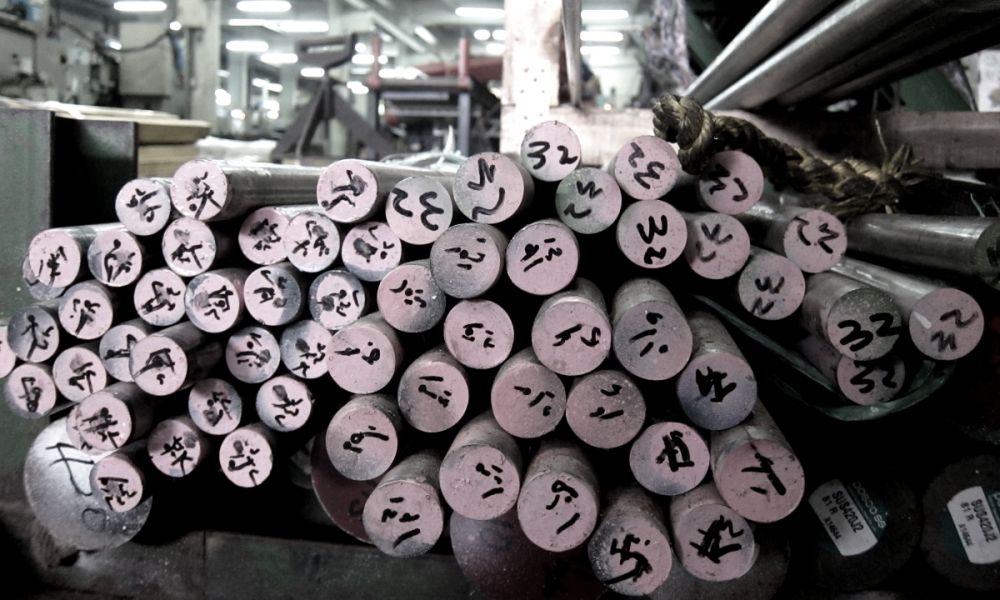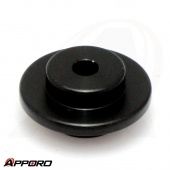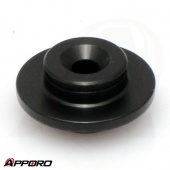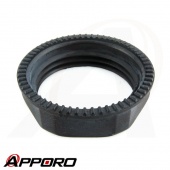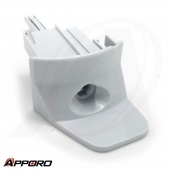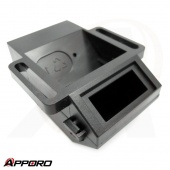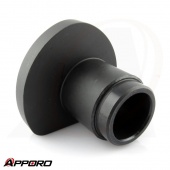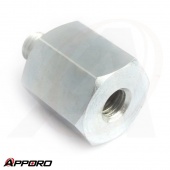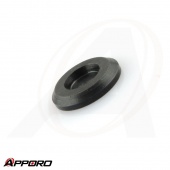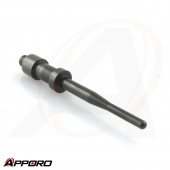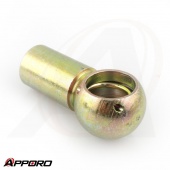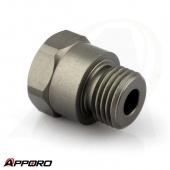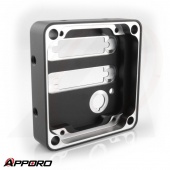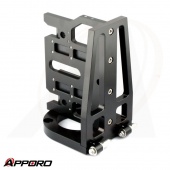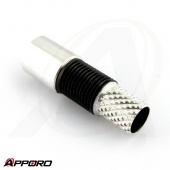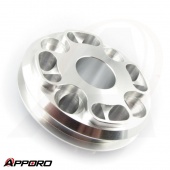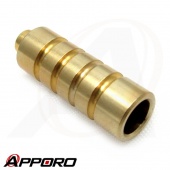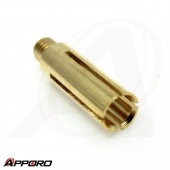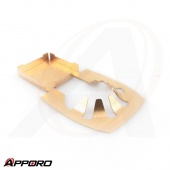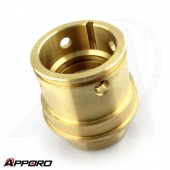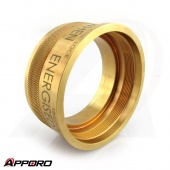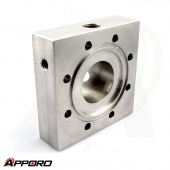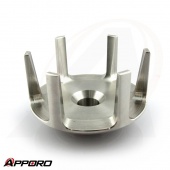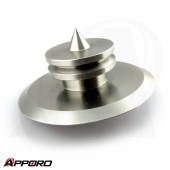CNC Machining Material
Plastic
Our production lines are also capable of precision plastic parts manufacturing by using CNC milling machine centers and automatic CNC Lathe machines.
Material availability:
| Plastic |
ABS, UDPE, HDPE, LDPE, Nylon 6, Nylon 66, MC Nylon, PC, PEEK PET-P(Ertalyte), PFA, POM(Acetal), PP, PPS(Techtron), Teflon(PTFE) |
|
| Glass filled plastic are also available for CNC machining. | ||
Acetal (POM, Delrin)
Acetal, known as polyoxymethylene(POM), Delrin, is an engineering thermoplastic widely used in precision CNC machining compontents. Featured with high stiffness, good heat resistance, low friction, great dimensional stability, excellent dielectric properties, resistant to moisture, wear and chemical. Great machinability for CNC machining service. Generally applicable to food industry, chemical industry, bearings, diving equipment, conventional equipment, gears, toy parts.
ABS (Acrylonitrile Butadiene Styrene)
ABS (Acrylonitrile Butadiene Styrene) is a well-known, low cost engineering CNC machining plastic. It is with excellent impact strength, toughness and also good tensile strength. It is ideal for CNC machining such like turning, drilling, milling, and sawing. Thus, there are more and more consumer products or many auto and truck components made of ABS.
Acrylic (methyl methacrylate, PMMA)
Acrylic (methyl methacrylate) (PMMA), is a well known thermoplastic, usually supplied in transparent color. Generally used as altertive to glass featured with lightweight, unbreakable.
Our CNC machining production lines are well-experience with precision milling, bonding and polishing of high accuracy component parts made of acrylic. Although acrylic materials can be failured when subject to tensile or compressive forces. However, CNC milling is able to efficient make complex machining processes for acrylic material. In generalAcrylic is mostly used in optical, automotive industries due to its optical and physical properties.
Nylon (Nylon 6, Nylon 66, PA, MC Nylon)
Alloy Steel, Carbon Steel
Different types of Alloy Steel
Alloy steel(*Ref 1.) is kind of carbon steel that is alloyed with a variety of elements in order to improve its mechanical properties. For example, strength, hardness, toughness, wear resistance, corrosion resistance and hardenability. Heat treatment may be required to achieve some of above improved properties.
AISI 4140 (SCM 440, 42CrMo4)
Most common alloy steel in CNC machining services. Averge machinability, good strength and stifness, good weldability for structure purpose. Widely used for shaft, transmission component, gear, mold, cold forging of automotive and industrial spare parts.
AISI 4340 (SNCM 439, 40CrNiMoA)
High toughness and strength in heat treated condition, good ductility and formability in the annealed condition. Averge machinable and welding capability. Mainly used in power transmission gears and shafts, aircraft landing gear, and other structural parts.
AISI 8620 (SCNM 220, 21NiCrMo2)
Common alloy steel used in bearing in dustrial. High hardness, anti-corrosion, contact fatigue strength after carburizing treatment, while the center of component remains tough and malleable. Mainly used in many internal engine components, suspension parts, bushings and automotive parts
AISI 4115 (SNCM 415, 15CrMo5)
Generally carburized for use, surface hardness can be between HRC 56-60 after case hardening. Mostly used as piston, transmission shaft and gear, spindle.
*Ref 1. Alloy Steel
Different types of Carbon Steel
Frankly speaking, carbon steel(*Ref 2.) is kind of steel with carbon content less than 2.1% by weight. Actually, we can generally use the term "carbon steel" to describe steel which is not stainless steel. As the carbon content increases, carbon steel is with better machinability able to get harder and stronger with heat treating treatment, but becomes less ductile.
AISI 12L14 (JIS SUM24L, DIN 9SMnPb36, free cutting steel)
So called free cutting steel(*Ref 3.) with excellent CNC machining capability. AISI 12L14 dosed with Lead can significantly improve its machinability. Can be case hardened to HV450. Available in square, round, and hexagon form. Generally used for shafts, bolts, valves, bushings, pins, fittings, machine screw, surgical and dental procedures utensils, certain automobile parts, instruments, etc.
AISI 1215 (JIS SUM23, DIN 9SMn36, free cutting steel)
AISI 1215 are resulphurized and rephosphorized free machining steels with excellent machinability. It forms small chips when machined. Nickel plating, chrome plating, zinc plating on 1215 steel are helpful for anti-corrosion. Mainly supplied for heavily machined components and parts subject to low stress levels, low shock loading.
AISI 1015 (JIS S15C)
One of mostly used low carbon steel. Lower strength compare to medium carbon steel, but good toughness, weldability, punching press properties. AISI 1015 is often used for manufacture of chain, rivets, bolts, shaft.
AISI 1045 (JIS S45C)
One of generally used medium carbon steel. Good wear-resistance and high strength. Capable of hardening by heat treatment to HRC 45. Widely used in mechanical parts and structural steel, such like sleeve, automobile shell, pistons, steam turbine, shafts of machine, worm, gear, crankshaft, spindle.
AISI 1144 (JIS SUM43, free cutting medium carbon steel)
One of often used medium carbon steel, contained Sulfur to enhance its machinability, so called free cutting medium carbon steel. Also featured with good wear-resistance and high strength. Mainly supplied for transmission components, such like gears, shafts, bolts, valves, bushings, pins, fittings, spring seat and machine screw, surgical and dental medical components, automobile parts, industrial instruments spare parts, etc.
JIS SK4 (SK95)
Contained 0.9-1.0% carbon by weight ratio, so called high carbon tool steel with great toughness, high strength and good wear-resistance. High hardenability, can be tempered to hardness at least HRC 62, less deformation in quenching. Generally used in a wide range of industrials including regular springs, spiral springs, knitting needles, horns, measuring tapes, pins, shafts, plug gauges and washers.
JIS SK5 (SK85, spring steel)
Contained 0.8-0.9% carbon by weight ratio, one of most common high carbon tool steel with great toughness, high strength and good anti-corrosion. High hardenability, can be tempered to hardness at least HRC 62, less deformation in quenching. Tempering treatment is required to improve springiness of machined parts made of JIS SK5. Generally supplied for industrial components such like automobile parts, blades, regular springs, clips, washers.
JIS SK7 (SK65, spring steel)
Contained 0.6-0.7% carbon by weight ratio, one of most common high carbon tool steel. High hardenability, can be tempered to hardness at least HRC 59, less deformation in quenching. Tempering treatment is required to improve springiness of machined parts made of JIS SK7. Generally supplied for industrial components such like automobile parts, coil springs, clip springs, washers.
*Ref 2. Carbon steel
*Ref 3. Free cutting steel: this kind of steel enables CNC lathe with automatic feeding equipment to run without human interaction which means efficiency and economic.
Aluminum Alloy
CNC machining aluminum part featured with economical, light weight and attractive is one of our core CNC machining service. Parts made from aluminum alloy(Ref*) are often less expensive because they can be machined in less time than many other metals such as steel. Although CNC machining aluminum parts do not require additional finishes, we can also supply anodized aluminum parts with various colors. Plain aluminum is resistant to corrosion as a thin protective layer is formed when exposed to the atmosphere.
Aluminum is with good machining condition, and has a high strength to weight ratio. It is also a good conductor of electricity and heat, making it ideal for heat sinks.
Different types of Aluminum Alloy
Below showed aluminum alloys generally used and supplied at Apporo:
Aluminum 1050
Known as a aluminium-based alloy of the commercially pure 1XXX series. Extremely soft and foldable, usually formed by extrusion or rolling. Commonly used in the electrical and chemical industries, because of having high electrical conductivity, corrosion resistance, and workability.
Aluminum 2024
Usually used in applications requiring high strength to weight ratio, as well as good fatigue resistance. Weldable through friction welding and average machinability. 2024 is widely used in aircraft structures, especially wing and fuselage structures under tension.
Aluminum 5052
Most common alloys of aluminum in sheet metal fabrication, such as stamping, laser engraving, wire cutting. Good machinability in bending, punching and shearing.
Aluminum 6061-T6
Good CNC machining capability and good weldability. Most common aluminum alloy for general purpose use. Widely used for aerospace construction, frame and housing of device, utility boats, bicycle frames and components. Often used in extrusions and hot forging of automotive and industrial spare parts.
Aluminum 6063-T5
Generally good mechanical properties and highly weldable. Mostly used in extruded shapes for architecture, particularly window frames, door frames, customized profile of frames, piping, tubing and furniture.
Aluminum 6082
Good CNC machining capability and good weldability. Common aluminum alloy for general purpose use. Widely used for aerospace construction, frame and housing of device, utility boats, bicycle frames and components. Often used in automotive and industrial spare parts.
Aluminum 7075
Strong, with good fatigue strength and average machinability, but not weldable. Cost is relatively high. Often used in aircraft including wings and fuselages, rock climbing equipment and bicycle components.
Brass, Bronze, Copper
Stainless Steel
Proudly introduce our top-end production capability: Stainless Steel parts. Apporo is a well-experienced in stainless steel milling parts and turning parts CNC machining services manufacturer in the world.
Material availability:
| Stainless Steel |
303, 304(18-8), 304L, 316(18-10), 316F, 316L 410, 3Cr12L, 420, 430, 440C, 630(17-4) (can be hardened by heat treating) |
|
You could contact us to get a free project review for your precision CNC machining stainless steel parts.
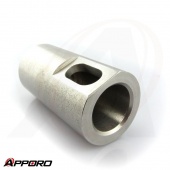
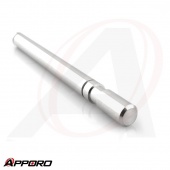
Material for CNC Machining Service
Lots materials can be used create plenty of options to manufacture no matter you would like with the CNC machines. From metal to plastic or even from wood to wax, the material options are literally endless as far as what materials can be used and what people are designing. In summary, the major advantages of CNC machining service are various of materials that can be used with them for plenty of options.
Material Capability
APPORO-CNC offers a wide variety of materials for your custom parts: aluminum, carbon steel, alloy steel, stainless steel, copper, brass, bronze, nylon, acetal, polycarbonate, polystyrene, acrylic, plastic, fiber glass and many more materials.
Materials can be supplied in rod, tube, sheet metal, bulk profiles for better production arrangement.
Tips of Choosing Material
It is challenge to decide on the best material for your CNC machined part. Generally speaking, there are various factors to make the decision. For instance, price, hardness, tolerance, environment, surface treatment, etc.
Below are some tips:
- Metals allow cnc machining parts with better tolerance than plastics.
- Plastics is lighter, but could deform slightly over time due to moisture absorption.
- Parts made by sheet metal is generally lower cost than machining from plate or rod.
- Materials that don't need finishing may be more economical for fastest production (e.g. stainless steel, plastics, titanium, etc.)

